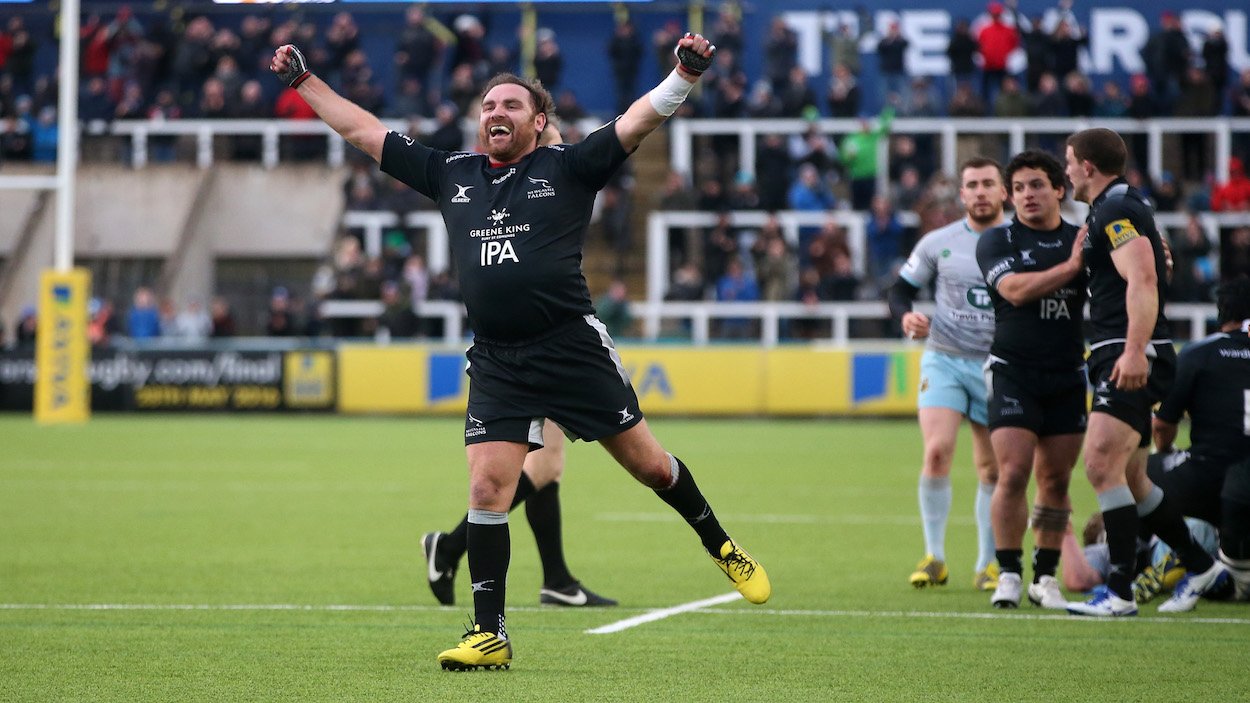Andy Goode has the conditioning of a golden oldies club player, the speed of a particularly unmotivated sloth, and he retired last year. So how did he manage to get himself nominated for Aviva Premiership Player of the Year in 2016?
There are some players who simply do not look like they have any right to be as good as they are, or even to be sportsmen at all, such is their appearance. Rugby League legend Wally Lewis had all the hallmarks of a truck driver yet was one of the greatest ever, tough as teak with the skills of a matador; 1980s English footballer Mick Quinn looked like Bob Seger’s less dynamic little brother.
But has there ever been an elite level sportsman whose appearance is less convincing of that fact than England fly-half Andy Goode? Even in his prime ten years ago he was overweight, looked about 42 years old and had the pace of a 1974 Austin Allegro. In fact his face even looks a bit like an Austin Allegro – a bald one, if that’s possible.
Somehow, for seventeen years he marshalled Leicester, Saracens, Brive, Sharks, Worcester and Wasps, winning premiership titles, European Cups and seventeen England caps with his boot being a particularly potent weapon.
[rugbypass-ad-banner id=”1473723660″]
What made Goode so, er, good was the quiet authority he brought to teams, the steady if unspectacular passing, the fabulous kicking out of hand and dead-eyed placekicking. That offset the bad: the tendency to take the ball up a bit too often and that truly woeful lack of pace – often he would break the line and find himself in open pasture only to splutter in slow motion for about eight metres before being tackled, usually by an almost-walking back row player on the turn.
But, as Donald Trump probably says, you can’t argue with results, and time and again this fella has shown that he is top-drawer. The drawer probably also contains a few stale doughnuts and a stinky vest, but it’s a top-drawer nonetheless and this season has been a crowning achievement in his often inexplicable career.
To give some context, Goode retired at the end of the 2014-15 season in physically the worst shape he’s ever been. With a gut like a darts player on top of injury issues, he headed off to the great clubhouse beyond the wall to live it up. Then on the 28th of December 2015 Newcastle Falcons came calling. They were deep in a relegation battle with London Irish, had fly-half cover issues, and it seems the first number of their speed dial was Goode, who had solved his injury problems by having Botox injections (honestly, you couldn’t make it up). Many laughed, some shook their heads but most forgot that regardless of what he looked like, Andy had always produced results, and so it proved again and he waddled into town like a Weeble with fingerless gloves and a combover.
The fly-half made seven appearances for Newcastle, starting four and appearing three times off the bench, playing a total of 344 minutes and scoring 57 invaluable points, including 11 in a 22-minute appearance off the bench to secure his new team a shock victory over Harlequins in January. Then came 29 gold-plated points across back-to-back victories over Leicester and Northampton in February that basically saved the Falcons’ season.
But what made his season truly memorable was his absolute refusal to appear like he was taking any of it too seriously. He would turn up to post-match media carrying a bottle of beer and throw his feet up on the table, tweet that he was having beer as recovery rather than any ice bath or warm down nonsense, and generally appear like he was loving every minute of it. He was a breath of fresh air amongst all the media coached banalities and publicity anxiety that so many modern pros display. Also, it felt like one of us was playing at the highest level and we’d like to think that’s exactly how we would approach it.
On the 27th of March his short-term contract ended and it was all over. As a parting shot Andy said “The game has moved on – and I’ve moved with it at a slower rate than other people – but what I lack in fitness, I make up for in game understanding and experience.”
He didn’t win Player of the Year – Leicester’s Telusa Veainu deservedly took those honours. But amusing and astonishing as this whole thing was, there is perhaps a serious point to be made, about Goode highlighting the conditioning culture in modern rugby that is causing the skills and game management to suffer. But that’s for another column.
For now, let’s just salute the fat enigma that is Andy Goode.






































































